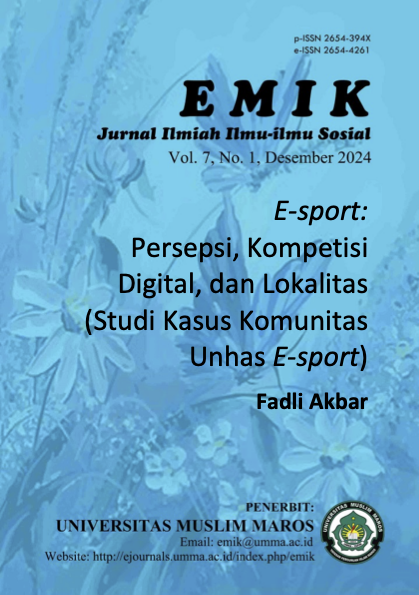E-sport: Persepsi, Kompetisi Digital, dan Lokalitas (Studi Kasus Komunitas Unhas E-sport)
DOI:
https://doi.org/10.46918/emik.v8i1.2704Keywords:
e-sport, digital sport, competition, habitus, localityAbstract
E-sport have evolved from a form of entertainment into a global industry with significant social, economic, and cultural impacts. While most studies focus more on negative impact of e-sport, very limited studies on the positive impact on this kind of sport, particularly among university students. This article explores e-sports practices within the university environment as a form of digital competition that goes beyond entertainment and becomes a medium for identity production, symbolic capital, as well as local expression.
Using a qualitative approach and a case study of the Unhas E-sport community, data were collected through participant observation and in-depth interviews with ten informants, consisting of three e-sport professional players, four e-sport fans, and three e-sport tournament organizers.
The findings reveal four key points: first, e-sports is perceived not merely as gaming, but as a career path and form of digital labor requiring discipline and strategy; second, campus-level tournaments are organized professionally, demanding intensive preparation and high mental resilience; third, the competition process involves media distribution strategies that construct reputation and symbolic capital; and fourth, e-sports practices reflect Makassar’s local expressions through team identity, cultural narratives, and the use of digital spaces. Overall, e-sports functions as a symbolic arena and microeconomic environment that fuses global gaming culture with local values, while also shaping a new digital habitus among university students.
References
Adiningtiyas, S. W. (2017). “Peran Guru Dalam Mengatasi Kecanduan Game Online,” Jurnal Kopasta, 4(1):28-40, https://www.journal.unrika.ac.id/index.php/kopastajournal/article/view/1121/894, diakses tanggal 15 Maret 2025.
Afuza, A.D. (2020). 4 Alasan E-sports Harus Jadi UKM di Kampus, https://syariah.uinsaid.ac.id/4-alasan-esports-harus-jadi-ukm-di-kampus/, diakses tanggal 15 April 2025.
Amanullah, J. (2021). E-sport Memang Olah Raga, https://ormawa.stekom.ac.id/berita/e-sport-memang-olahraga, diakses tanggal 3 April 2025.
Appadurai, A. (1996). Modernity at Large: Cultural Dimensions of Globalization. Minneapolis: University of Minnesota Press.
Apriani, K. & Yuono, D. (2019). “Pusat Esport Jakarta,” Jurnal Stupa: Sains, Teknologi, Urban, Perancangan, Arsitektur, 1(1):204-213, https://doi.org/10.24912/stupa.v1i1.3957, diakses tanggal 20 Maret 2025.
Bailey, K.; West, R.; & Anderson, C. (2010). “A Negative Association Between Video Game Experience and Proactive Cognitive Control,” Psychophysiology, 47(1):34-42, https://pubmed.ncbi.nlm.nih.gov/19818048/, diakses tanggal 12 Maret 2025.
Bourdieu, P. (1984). Distinction: A Social Critique of the Judgement of Taste. Cambridge: Harvard University Press.
Braun, V., & Clarke, V. (2006). “Using Thematic Analysis in Psychology,” Qualitative Research in Psychology, 3(2), 77–101, https://doi.org/10.1191/1478088706qp063oa, diakses tanggal 28 Januari 2025.
Dandi, K. (2021). “Persepsi Generasi Z Terhadap E-Sport: Studi Kasus pada Komunitas Gamer,” Jurnal Pendidikan Jasmani Khatulistiwa (JPJK), https://jurnal.untan.ac.id/index.php/JPJK/article/viewFile/60760/75676595703, diakses tanggal 13 Maret 2025.
Glenniza, D. 2018. Bermain Game dan E-sport Tak Sama Dengan Olah Raga, https://sport.detik.com/aboutthegame/pandit/d-3078400/bermain-video-game-dan-esport-tak-sama-dengan-olahraga, diakses tanggal 2 April 2025.
Hamari, J., & Sjöblom, M. (2017). “What is E-sport and Why Do People Watch It?,” Computers in Human Behavior, 71:151-160, https://www.sciencedirect.com/science/article/pii/S1066224317000430, diakses tanggal 17 Januari 2025. https://www.ggwp.id/2017/09/17/penonton-eSport-di-atas-olahraga/, diakses tanggal 11 Maret 2025.
Indonesia Esports Association (IESPA). (2022). Laporan Tahunan Industri Esports Indonesia 2020–2022. Jakarta: IESPA, https://iespa.net/, diakses tanggal 15 Maret 2025.
Jenny, S. E., Manning, R. D., Keiper, M. C., & Olrich, T. W. (2017). “Virtual(ly) Athletes: Where E-sport Fit Within the Definition of ‘Sport’,” Quest, 69(1):1–18, https://doi.org/10.1080/00336297.2016.1144517, diakses tanggal 17 Januari 2025.
Kurniawan, F. (2020). ”E-sport Dalam Fenomena Olah Raga Kekinian,” Jorpres: Jurnal Olah Raga Berprestasi, 15(2):61-66, https://www.researchgate.net/publication/364946066_E-Sport_dalam_Fenomena_Olahraga_Kekinian, diakses tanggal 13 Maret 2025.
Mulyadi, D.V.; Fitri, M.; Williyanto, S. 2023. “The Influence of Esports on Adolescents' Social Skills,” Jurnal Pendidikan Jasmani, Olah Raga, dan Kesehatan, 7(1): 27-38, https://pdfs.semanticscholar.org/3105/e60ccf1ac7625562fa2c1134984f8725bb4b.pdf, diakses tanggal 24 Mei 2025.
Priangga, Y.S. 2023. Ekstrakurikuler E-sport, https://www.researchgate.net/publication/367176503_artikel_desain_Ekstrakurikuler_E-Sport_Olahraga_elektronik, diakses tanggal 15 maret 2025.
Safitri, S. S. (2020). “Game Online dan Pengaruh Interaksi Sosial di Kalangan Mahasiswa di Universitas Muhammadiyah Surakarta,” Edumaspul: Jurnal Pendidikan, 4(2):364–376, https://doi.org/10.33487/edumaspul.v4i2.533, diakses tanggal 15 Maret 2025.
Scholz, T. M. (2019). E-sport is Business: Management in the World of Competitive Gaming. Cham: Springer Nature.
Taylor, T. L. (2012). Raising the Stakes: E-Sports and the Professionalization of Computer Gaming. Cambridge: MIT Press.
Turnip, B. R., & Hukom, A. (2023). “Pengaruh Perkembangan Industri E-sports Terhadap Pertumbuhan Ekonomi Indonesia,” Cemerlang: Jurnal Ilmiah Mahasiswa Ekonomi Pembangunan, 3(2):178–188. https://doi.org/10.55606/cemerlang.v3i2.1127, diakses tanggal 27 Januari 2025.
Wahyuni, D. (2020). “Tantangan dan peluang Esports Dalam Keolahragaan Nasional.” Kajian, 25(4):341-353.

Downloads
Published
Issue
Section
License
Copyright (c) 2025 Fadli Akbar

This work is licensed under a Creative Commons Attribution-ShareAlike 4.0 International License.








9.png)















